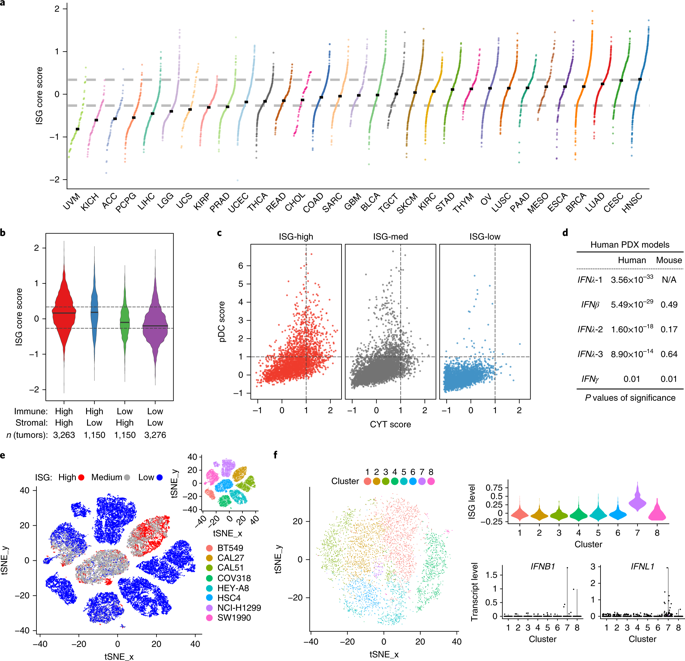Our official English website, www.x-mol.net, welcomes your
feedback! (Note: you will need to create a separate account there.)
Tumor-derived IFN triggers chronic pathway agonism and sensitivity to ADAR loss.
Nature Medicine ( IF 58.7 ) Pub Date : 2019-Jan-01 , DOI: 10.1038/s41591-018-0302-5 Huayang Liu 1 , Javad Golji 1 , Lauren K Brodeur 1 , Franklin S Chung 1 , Julie T Chen 1 , Rosalie S deBeaumont 1 , Caroline P Bullock 1 , Michael D Jones 1 , Grainne Kerr 2 , Li Li 1 , Daniel P Rakiec 1 , Michael R Schlabach 1 , Sosathya Sovath 1 , Joseph D Growney 1 , Raymond A Pagliarini 1 , David A Ruddy 1 , Kenzie D MacIsaac 1 , Joshua M Korn 1 , E Robert McDonald 1
Nature Medicine ( IF 58.7 ) Pub Date : 2019-Jan-01 , DOI: 10.1038/s41591-018-0302-5 Huayang Liu 1 , Javad Golji 1 , Lauren K Brodeur 1 , Franklin S Chung 1 , Julie T Chen 1 , Rosalie S deBeaumont 1 , Caroline P Bullock 1 , Michael D Jones 1 , Grainne Kerr 2 , Li Li 1 , Daniel P Rakiec 1 , Michael R Schlabach 1 , Sosathya Sovath 1 , Joseph D Growney 1 , Raymond A Pagliarini 1 , David A Ruddy 1 , Kenzie D MacIsaac 1 , Joshua M Korn 1 , E Robert McDonald 1
Affiliation

|
Interferons (IFNs) are cytokines that play a critical role in limiting infectious and malignant diseases 1-4 . Emerging data suggest that the strength and duration of IFN signaling can differentially impact cancer therapies, including immune checkpoint blockade 5-7 . Here, we characterize the output of IFN signaling, specifically IFN-stimulated gene (ISG) signatures, in primary tumors from The Cancer Genome Atlas. While immune infiltration correlates with the ISG signature in some primary tumors, the existence of ISG signature-positive tumors without evident infiltration of IFN-producing immune cells suggests that cancer cells per se can be a source of IFN production. Consistent with this hypothesis, analysis of patient-derived tumor xenografts propagated in immune-deficient mice shows evidence of ISG-positive tumors that correlates with expression of human type I and III IFNs derived from the cancer cells. Mechanistic studies using cell line models from the Cancer Cell Line Encyclopedia that harbor ISG signatures demonstrate that this is a by-product of a STING-dependent pathway resulting in chronic tumor-derived IFN production. This imposes a transcriptional state on the tumor, poising it to respond to the aberrant accumulation of double-stranded RNA (dsRNA) due to increased sensor levels (MDA5, RIG-I and PKR). By interrogating our functional short-hairpin RNA screen dataset across 398 cancer cell lines, we show that this ISG transcriptional state creates a novel genetic vulnerability. ISG signature-positive cancer cells are sensitive to the loss of ADAR, a dsRNA-editing enzyme that is also an ISG. A genome-wide CRISPR genetic suppressor screen reveals that the entire type I IFN pathway and the dsRNA-activated kinase, PKR, are required for the lethality induced by ADAR depletion. Therefore, tumor-derived IFN resulting in chronic signaling creates a cellular state primed to respond to dsRNA accumulation, rendering ISG-positive tumors susceptible to ADAR loss.
中文翻译:

肿瘤来源的 IFN 触发慢性通路激动和对 ADAR 丢失的敏感性。
干扰素 (IFNs) 是在限制传染病和恶性疾病1-4中发挥关键作用的细胞因子。新兴数据表明,IFN 信号传导的强度和持续时间可以不同地影响癌症治疗,包括免疫检查点阻断5-7. 在这里,我们描述了癌症基因组图谱中原发性肿瘤中 IFN 信号的输出,特别是 IFN 刺激基因 (ISG) 特征。虽然免疫浸润与一些原发性肿瘤中的 ISG 特征相关,但存在 ISG 特征阳性肿瘤而没有明显浸润产生 IFN 的免疫细胞表明癌细胞本身可能是产生 IFN 的来源。与这一假设一致,对在免疫缺陷小鼠中繁殖的患者来源的肿瘤异种移植物的分析显示 ISG 阳性肿瘤的证据与源自癌细胞的人类 I 型和 III 型 IFN 的表达相关。使用具有 ISG 特征的癌细胞系百科全书的细胞系模型进行的机制研究表明,这是 STING 依赖性途径的副产物,导致慢性肿瘤衍生的 IFN 产生。这对肿瘤施加了转录状态,使其对由于传感器水平(MDA5、RIG-I 和 PKR)增加而导致的双链 RNA (dsRNA) 的异常积累作出反应。通过询问我们跨 398 个癌细胞系的功能性短发夹 RNA 筛选数据集,我们表明这种 ISG 转录状态产生了一种新的遗传脆弱性。ISG 签名阳性癌细胞对 ADAR 的丢失敏感,ADAR 是一种 dsRNA 编辑酶,也是一种 ISG。全基因组 CRISPR 基因抑制筛选显示整个 I 型 IFN 通路和 dsRNA 激活激酶 PKR,ADAR 耗竭引起的杀伤力是必需的。因此,导致慢性信号传导的肿瘤来源的 IFN 会产生一种细胞状态,准备好对 dsRNA 积累作出反应,从而使 ISG 阳性肿瘤易受 ADAR 损失的影响。
更新日期:2019-01-27
中文翻译:

肿瘤来源的 IFN 触发慢性通路激动和对 ADAR 丢失的敏感性。
干扰素 (IFNs) 是在限制传染病和恶性疾病1-4中发挥关键作用的细胞因子。新兴数据表明,IFN 信号传导的强度和持续时间可以不同地影响癌症治疗,包括免疫检查点阻断5-7. 在这里,我们描述了癌症基因组图谱中原发性肿瘤中 IFN 信号的输出,特别是 IFN 刺激基因 (ISG) 特征。虽然免疫浸润与一些原发性肿瘤中的 ISG 特征相关,但存在 ISG 特征阳性肿瘤而没有明显浸润产生 IFN 的免疫细胞表明癌细胞本身可能是产生 IFN 的来源。与这一假设一致,对在免疫缺陷小鼠中繁殖的患者来源的肿瘤异种移植物的分析显示 ISG 阳性肿瘤的证据与源自癌细胞的人类 I 型和 III 型 IFN 的表达相关。使用具有 ISG 特征的癌细胞系百科全书的细胞系模型进行的机制研究表明,这是 STING 依赖性途径的副产物,导致慢性肿瘤衍生的 IFN 产生。这对肿瘤施加了转录状态,使其对由于传感器水平(MDA5、RIG-I 和 PKR)增加而导致的双链 RNA (dsRNA) 的异常积累作出反应。通过询问我们跨 398 个癌细胞系的功能性短发夹 RNA 筛选数据集,我们表明这种 ISG 转录状态产生了一种新的遗传脆弱性。ISG 签名阳性癌细胞对 ADAR 的丢失敏感,ADAR 是一种 dsRNA 编辑酶,也是一种 ISG。全基因组 CRISPR 基因抑制筛选显示整个 I 型 IFN 通路和 dsRNA 激活激酶 PKR,ADAR 耗竭引起的杀伤力是必需的。因此,导致慢性信号传导的肿瘤来源的 IFN 会产生一种细胞状态,准备好对 dsRNA 积累作出反应,从而使 ISG 阳性肿瘤易受 ADAR 损失的影响。





















































 京公网安备 11010802027423号
京公网安备 11010802027423号